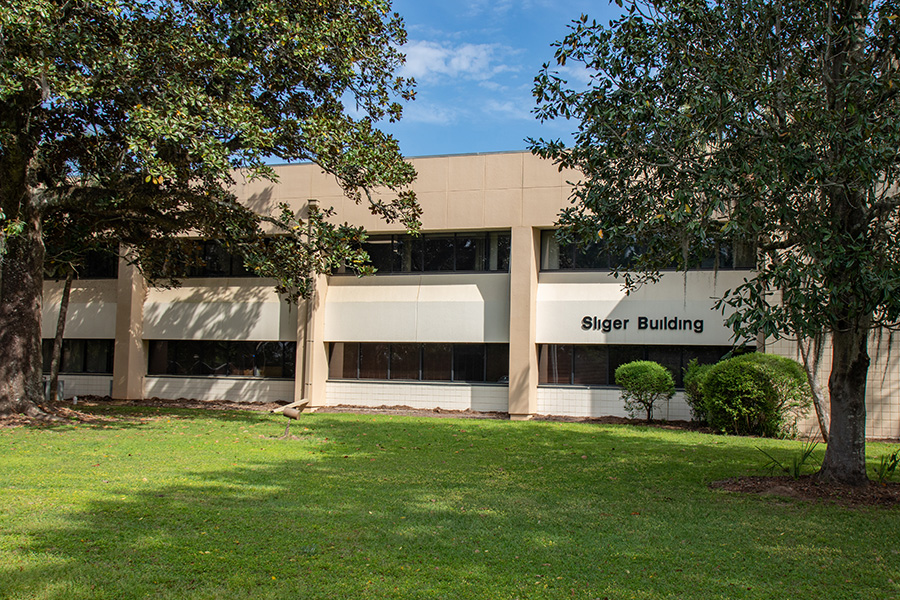
Florida State University will soon become the home of a state-of-the-art Real-Time Crime Center that will bring together the Tallahassee area’s law enforcement agencies and some of the nation’s leading criminology researchers in an effort to make the community safer.
The new RTCC will act as a hub for collaboration between the FSU Police Department, the Leon County Sheriff’s Office and the Tallahassee Police Department, as well as the Florida Department of Law Enforcement (FDLE) and the Capitol Police. While there are real-time crime centers in cities across the nation, Tallahassee’s will benefit from an in-house learning lab that will allow researchers and students from FSU’s College of Criminology and Criminal Justice to provide immediate analysis of crime trends.
“The Real-Time Crime Center will help all our law enforcement agencies in the area capitalize on an expanding range of technologies for efficient and effective policing,” FSUPD Chief Terri Brown said. “It will make this community safer. It will allow law enforcement officers to respond immediately to crimes in progress, and we’ll have the technology to hopefully solve these crimes sooner. And, with the assistance of Dean Tom Blomberg and his research team, we can analyze the data and hopefully, prevent future crimes.”
Blomberg said the research piece will make the FSU-headquartered center stand out from cities like New York, Los Angeles and Atlanta.
“None of the other real-time crime centers have a built-in research component, particularly involving the kind of high-level statistical research capacity that we will be able to bring to bear,” Blomberg said. “We’ll be educating our students on the use of this technology and its potential application in other areas like probation and parole. It’s a win-win situation.”
The project has been a long time in the making. The Leon County Sheriff’s Office launched the first generation of the area’s RTCC in 2017. After she became chief in 2019, Brown toured the facility and started a discussion with LSCO officials on how the university could help reduce crime locally. Eventually, Brown brought representatives from LSCO and TPD to meet with President John Thrasher, who supported the idea of the university investing in the expansion of a Real-Time Crime Center for the area.
“We started having meetings about what this would look like,” Brown said. “We tried to secure a place on campus that would be neutral for everyone.”
The first phase of renovations is underway on a space in the Sliger Building, located in Innovation Park. The city, county and FSU are financing the $2.3 million project, which Brown said she hopes to be operational within a year.
Brown is excited about the positive outcomes that the RTCC will immediately have on crime in the community.
“We’ll be able to communicate information across local, state and federal channels so it will give real-time information that the analysts working can access — cameras, license plate readers and anything that has to do with a crime,” Brown said. “When a crime is occurring in real time, the center will assist the officers so they can respond more effectively. They’ll have the information they need for a better response.”
Leslie Rabon, a certified law enforcement analyst, is the executive director of the Criminal Intelligence and Analysis Unit at the Leon County Sheriff’s Office and has been involved with the RTCC since the beginning.
“Since its inception, the Leon County Sheriff’s Office Real-Time Crime Center has aided in numerous active investigations resulting in tremendous outcomes,” Rabon said. “The collaborative effort between the agencies participating and utilizing the Real-Time Crime Center illustrates the commitment to building stronger relationships between area law enforcement which, in turn, will make our communities safer.”
Tallahassee Police Chief Lawrence Revell is optimistic about the new initiative.
“When it comes to combating crime, joint efforts are one of the most effective ways to get the job done,” Revell said. “We are excited to combine efforts and resources with FSUPD and LCSO in the creation of the multi-agency Real-Time Crime Center. Having a centralized information center to share criminal intelligence data will allow quicker resolutions to investigations, as well as enhance the overall efficiency and safety of all law enforcement operations within our community.”
Blomberg believes the research component of the RTCC has the potential to change how the area’s law enforcement officers approach their work.
“There are a lot of things that this technology is going to enhance, but I think the key underlying theme is proactive rather than reactive policing,” Blomberg said. “Through this technology, the Tallahassee area will be able to identify hot spots — and potential hot spots — and hopefully, proactively provide resources in relationship to those. This is quite different from traditional law enforcement, which is reactive.”
Researchers will analyze the region’s crime trends and how they change over time, as well as inform the agencies if tactics work or not in a certain area so officers can adjust their strategies depending on the outcome.
“It’s going to not only be research on outcome assessment, but it will serve a diagnostic function and enable the RTCC to modify, build or expand operations as the data demonstrates the need to do,” Blomberg said. “It’s a perfect opportunity for us to use evidence to form criminal justice policy, not just for our particular crime center, but for law enforcement agencies around the country.”
Having a learning lab embedded within the RTCC also offers students an opportunity for hands-on, real-life training.
“We’re giving them tools that will translate in their future careers,” Blomberg said. “Many of our students work with the FBI or become police chiefs or sheriffs. This will be an unprecedented opportunity for them to learn about the latest technology and develop skills using that technology.”



